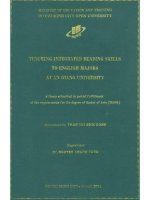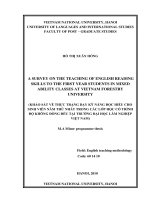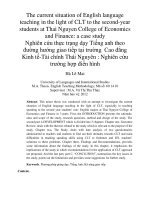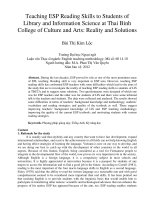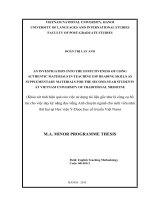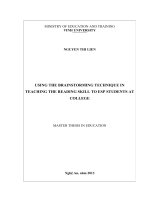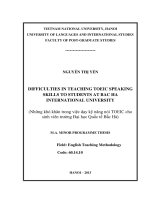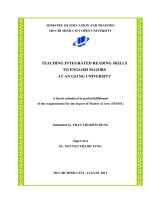Teaching ESP Reading Skills to Students of Library and Information Science at Thai Binh College of Culture and Arts Reality and Solutions
Bạn đang xem bản rút gọn của tài liệu. Xem và tải ngay bản đầy đủ của tài liệu tại đây (131.7 KB, 3 trang )
Teaching ESP Reading Skills to Students of
Library and Information Science at Thai Binh
College of Culture and Arts: Reality and Solutions
Bùi Thị Kim Lộc
Trường Đại học Ngoại ngữ
Luận văn Thạc sĩ ngành: English teaching methodology; Mã số: 60 14 10
Người hướng dẫn: M.A. Phan Thị Vân Quyên
Năm bảo vệ: 2012
Abstract. During the last decades, ESP proved its role as one of the most prominent areas
of EFL teaching. Reading skill is very important in ESP area. However, teaching ESP
reading skills has confronted ESP teachers with some difficulties which lead to the aims of
the study that are to investigate the reality of teaching ESP reading skills to students of LIS
at TBCCA and to suggest some solutions. Two questionnaires were designed of which one
was for ESP teachers and the other was for students of LIS and there were some informal
talk to the teachers and students. The data were collected and analyzed. The results showed
some difficulties in terms of teachers’ background knowledge and methodology; students’
vocabulary and reading strategies; and quality of the textbook as well. These suggest
improving teachers’ background knowledge of LIS and ESP teaching methodology;
improving the quality of the current ESP textbook; and motivating students with various
reading strategies.
Keywords. Phương pháp giảng dạy; Tiếng Anh; Kỹ năng đọc
Content
1. Rationale for the study
It is usually said that anybody and any country that want to have fast development, expand
international relationships, and receive the achievements in all fields can not help knowing English
and having effect strategies of learning the language. Vietnam is now on our way to develop, and
we are doing our best to catch up with the development of other countries in the world in all
aspects. Because of this feature, English, being considered as a tool for Vietnamese people to
integrate to the developmental flow of the world, now proves its very important role in the society.
Although English is a foreign language, it is a compulsory subject in most schools and
universities. It is highly appreciated at universities because it is a passport for students of any
majors to access the information and to find a good job in the future. According to Carrell (1981),
reading is the most important of the four macro language skills in English as a second language.
Eskey (1970) said that the ability to read the written language at a reasonable rate and with good
comprehension seemed to be considered more important than oral skills. It has been pointed out
that teaching English is to provide students with the linguistic basis that would enable him to
participate in transferring other nations’ scientific and technological advances that can enhance the
progress of his nation. ESP has appeared because of the aim, too. ESP reading enables students
read materials and update information on their specific field, perhaps science or technology
Having been teacher of ESP, I always take interest in how to help my students obtain
necessary knowledge in their specific field in English. In order to do that, I have tried my best to
study the language and teaching methods to help students study their specific field in English. That
has resulted in my little success in teaching ESP. But in fact, I still have some difficulties with
which my colleagues meet, too. In order to overcome the difficulties, the first thing should be done
was specify what the difficulties were. That was why I decided to conduct a study on “Teaching
ESP Reading to students of Library and Information Science at Thai Binh College of Culture and
Arts: Reality and Solutions”.
2. Objectives of the study
The study is conducted to achieve the following aims:
- To investigate the current situation of teaching and learning English for Library and
Information Science at TBCCA in order to find out the teachers’ and learners’ needs and
difficulties when teaching and learning ESP reading skills.
- To suggest some ways to overcome the difficulties and to help students improve their ESP
reading skills.
3. Research questions
- How is ESP reading skills taught at TBCCA?
- What are the difficulties in ESP teaching and learning at TBCCA?
- What are suggestions for teaching and learning ESP reading skills more effectively?
4. The significance of the study
As mentioned in Rationale, reading is the most important skill that enables learners to
access information for entertainment, study, research or work. This is true for students of Library
and Information Science at TBCCA. However, ESP reading skills are not taught effectively here.
To some extent, the study contributes to the improvement of the quality of teaching and learning
ESP at TBCCA.
5. Methods of the study
To carry out this study, survey research was employed.
6. Scope of the study
Because of the limited time, the study merely focused on investigation of difficulties in
teaching ESP reading skills to students of LIS at TBCCA. Then some solutions were made to
improve the quality of teaching and learning ESP reading.
7. Organization of the study
The study is organized into three main parts: Introduction, development, and conclusion
Part A named as Introduction presents the rationale for choosing the topic of the study, the
aims, research questions, the significance, the methods, the scope and the organization of the
study.
Part B named as Development includes five chapters:
- Chapter I reviews the theoretical background including the nature of reading, ESP reading
and some characteristics of English for LIS.
- Chapter II presents the methodology.
- Chapter III presents data analysis and findings.
- Chapter IV gives pedagogical implication.
Part C named as Conclusion gives the conclusion the study, points out the limitations, and
offers some suggestions for further study.
References
I. Vietnamese authors
1. N.T. Huyen (2009). Teachers’ Perceived Challenges in Teaching ESP to the First-year
students of Economics Department in Sao Do College of Industry.
2. T.T.M. Nguyet (2007). Teaching reading ESP in Integration with the Other Language Skills to
Students of Linguistics.
II. Foreign authors
1. Abbott G., Wingard P. (1985). The Teaching of English as an International Language. Collins,
London.
2. Carrel, P.L. (1981). The Effects of Rhetorical Organizations on ESL Readers. TESOL Quarterly
18: 441- 469.
3. Carrel P. L, Devine J. & Eskey D. E (1989). Interactive Approaches to Second Language
Reading. Cambridge University Press.
4. Doff A. (1988). Teach English Teacher’s Workbook: A Training Course for Teachers (2).
Cambridge University Press, Cambridge.
5. Doff A. (1988). Teach English: A Training Course for Teachers: Trainer’s Handbook (2).
Cambridge University Press, Cambridge.
6. Dudley - Evans T. and St John M. J. (2000). Developments in ESP: A multi-disciplinary
approach. Cambridge University Press.
7. Eskey, D.E (1970). A new Technique for the Teaching of Reading to Advanced Students.
TESOL Quarterly 4 (4): 315 - 321.
8. Esteban A. A. and Martos M. C. V. (2002). A Case Study of Collaboration Among the ESP
Practitioner, the Content Teacher, and the Students. Revista Alicantina de Estudios Ingleses 15: 7-
21.
9. Grellet F. (1990). Developing Reading Skills: A practical guide to reading comprehension
exercises. Cambridge University Press.
10. Hutchinson T. and Waters A. (1989). English for Specific Purposes: A learning-centred
approach. Cambridge University Press.
11. Johns T. and Davies F. (1983). Text as a Vehicle for Information: the Classroom Use of
Written Texts in Teaching Reading in a Foreign Language. Reading in a Foreign Language I: 1-19
12. Nuttall C. (2000). Teaching Reading Skills in a foreign language. Macmillan Heinemann
English Language Teaching.
13. Silberstein S. (1994). Techniques and Resources in Teaching Reading. Oxford University
Press
14. Snow C. (2002). Reading for Understanding: toward an R&D Program in Reading
Comprehension. RAND.
III. Internet sources
1. Anthony L. (2005). Defining English for Specific Purposes and the Role of the ESP
Practitioner. Retrieved from
2. Corps P. (1986), ESP: Teaching English for specific purposes, Hormation Collection &
Exchange. Retrieved from
3. Salmani-Nodoushan M. A. (2002), Text Familiarity, Reading Tasks, and ESP Test. Language in
India. Retrieved from
4. Sierocka H. (2008). The Role of the ESP Teacher. Business English. Retrieved from
5. Timothy B. (1998). Extensive reading: Why? And how?. The Internet Journal IV (12).
Retrieved from

